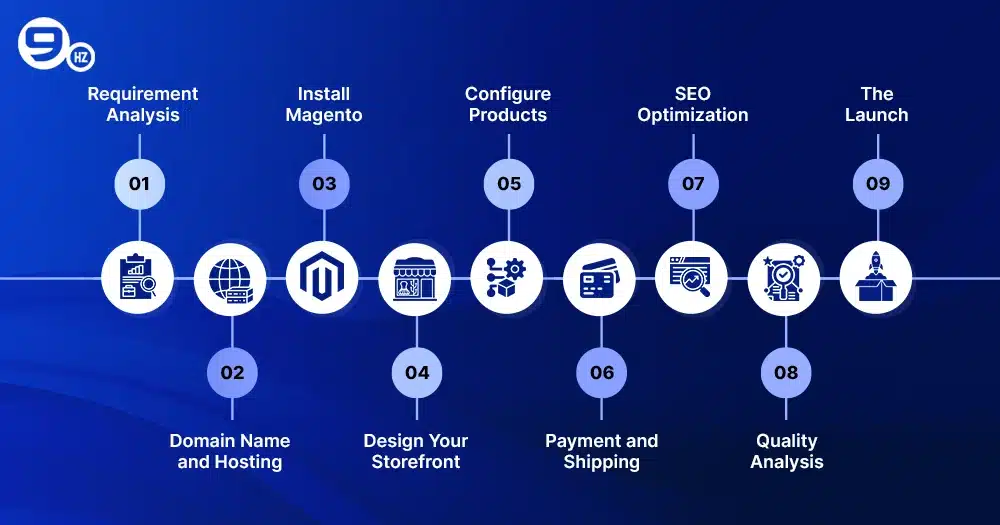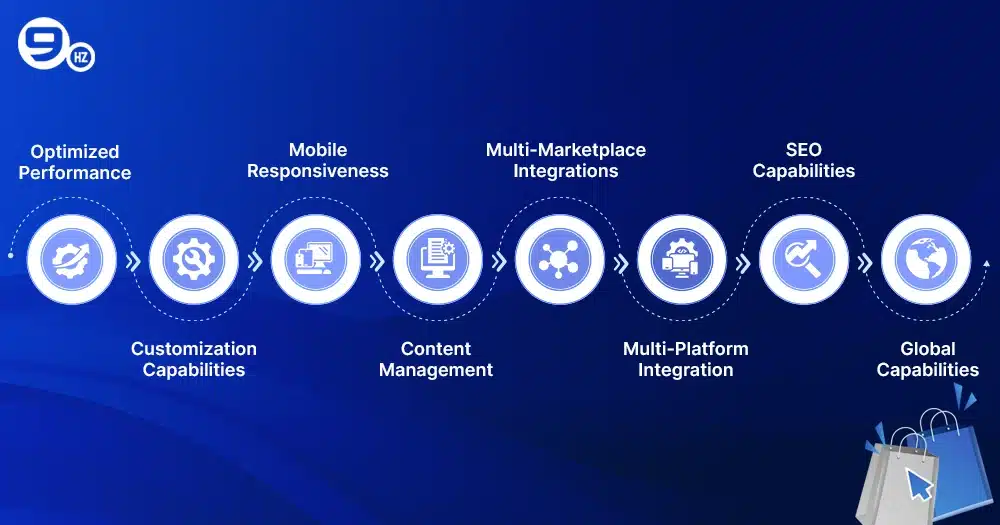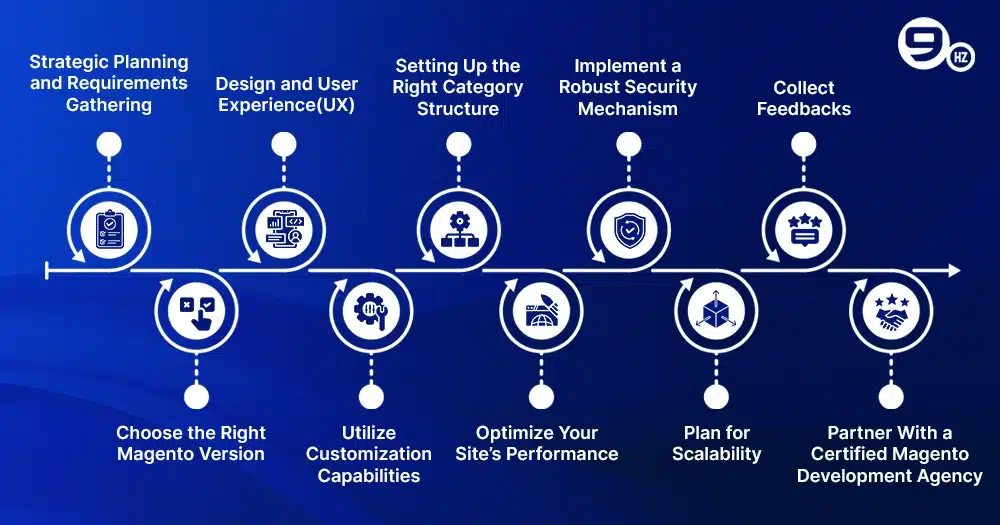The success story of Sinsay, Omega watches, Helly Hansen, Monin, and Liverpool FC online store inspires businesses. Do you know what is common between all these brands? The truth is, all brands have an eCommerce store powered by Magento. Not only these brands, but Magento eCommerce development has reshaped numerous brands that we shop for often.
The eCommerce platform market revenue forecast for 2030 is $23.27 billion at a CAGR of 18.1%(2024-2030). Surprisingly, Magento is the third-leading eCommerce platform solution worldwide. Supporting complex integrations for global businesses, Magneto powers 239,00 eCommerce websites worldwide.
The brand Omega has existed since 1848, but now all luxury watches are available online through its official online store, offering a seamless user experience. It’s Magneto’s magic that leaves customers in awe while shopping.
If you are an entrepreneur looking to take your business to an online platform, Magento is one of the right options. Here, we have created a Magento eCommerce development step-by-step guide, outlining all the information to make things easy for you.
Let’s explore!
What is Magento?
Magento(now Adobe Commerce) is a platform with built-in PHP and a composable eCommerce solution allowing businesses to build online stores. Using this single cloud-native platform, you can create exceptional global, multi-brand B2C and B2B experiences for your customers.
Its capabilities and features set it apart from the other eCommerce platforms, such as:
- Seamless Digital Storefronts: Launch your online shopping store quickly using prebuilt storefront components and AI-powered content creation tools.
- Real-time Personalization: Personalize every customer interaction using real-time commerce data, AI-powered search, and custom campaigns to boost loyalty and sales.
- Composable Commerce: Create innovative and personalized eCommerce experiences for your customers with the API-first, composable platform Magento, which includes flexibility and scalability.
- Scalable operations: Run your business on a secure, cloud-native platform that automatically scales to handle peak traffic and supports enterprise growth.
- Accelerated Sales: Boost your sales and operate your business effortlessly, no matter what business model you follow, i.e., B2B, D2C, B2B2C, or B2B2B.
Considering all these, Magento is a one of the best eCommerce platform, and if your question is – Where to start?
Let’s dive into the next section, outlined as a step-by-step guide for Magento eCommerce development.
Magento eCommerce Development- Step-by-Step Guide
Magento website development can open the door to limitless business opportunities. But when it comes to developing an eCommerce website, businesses often struggle with one question:How to build an online store with Magento?
It’s a valid question because, without a clear strategy, developing an online store can feel like searching for a needle in a haystack.
The right direction and strategy lead to the right results, especially when it comes to Magento eCommerce store development.
Let’s end this eagerness. Here are the steps!
1. Requirement Analysis
Whatever steps you will follow, the entire effort is for your business, so don’t hesitate to ask yourself some questions like:
- What products do you want to sell?
- To whom are you going to sell your products?
- How much can you spend?
- Want to use a pre-designed theme or need customization?
- What features do you want to implement?
- Do you want to use Magento payment methods or integrate payment gateways?
- Do you need any third-party integrations?
To cover all these, document all your requirements clearly.
2. Domain Name and Hosting
Domain name will be your business’s online identity, and web hosting will be the foundation that stores your site’s data and keeps it accessible online. Choose the domain name that suits your brand’s idea and reflects your brand.
On the other hand, factors such as uptime, scalability, and security should be considered when setting up web hosting. Always choose a hosting provider that ensures 99.9% uptime and offers all required security features, such as a firewall, encryption, SSL certificate, and compliance-ready security protocols. If you have any difficulty, consult an experienced Magento development service provider. The experts will recommend the best option suited to your idea and budget.
Transform Your eCommerce Vision into Reality with Expert Magento Development
Schedule a Consultation Today.
3. Install Magento
The most crucial step of Magento eCommerce development is installing Magento. There are two ways to install it: manually or using Composer. You can also refer to the official Adobe Commerce developer documentation.
But wait for a second!
Are you tech-savvy? Or do you know how to set things up? Not everyone can do either. So, hire Magento eCommerce developers, and from here onwards, they will assist with each step, i.e., storefront development, setting up extensibility, handling APIs and SDKs, and more.
Once Magento is installed, move to the next crucial step.
4. Design Your Storefront
Both options are valid and the best in their respective places: pre-built themes and Custom development. However, the actual things depend on your requirements.
On one hand, pre-built designs are cost-effective, but customization is limited. On the other hand, custom Magento eCommerce design allows you to tailor your store’s design to reflect your brand’s identity and match your target audience’s preferences. Experienced eCommerce developers will help you customize the color scheme, logo, images, layout, and others.
5. Configure Products
Configuring products is one of the most crucial steps of Magento eCommerce development. When setting up products, you need to set up product types, product descriptions, product attributes and options, and product categories. Configure products in Magento by setting details like name, price, SKU, inventory, and images while choosing the right product type. Use attributes, categories, and options to organize and personalize the catalog, including reviews, upselling, and videos.
6. Payment and Shipping
Payments and shipping facilitate transactions on an eCommerce store and are integral parts of the checkout process. Configuring a seamless checkout process helps convert potential visitors into customers. So, you can choose a shipping method that matches your needs—flat rate shipping, table rates, free shipping, and carrier-calculated shipping.
You can set up payment methods in two ways: either by choosing built-in options such as PayPal and Authorize.Net or by integrating third-party payment gateways like Stripe, Braintree, and others.
7. SEO Optimization
There are thousands of eCommerce stores competing with each other. SEO optimization helps improve an eCommerce website or an online store’s visibility and rankings in SERPs. So, the better results will come after you optimize your store for SEO using techniques such as on-page, off-page, and technical SEO.
If you already have an in-house SEO team, that’s great, but if not, you can also ask for SEO services from the Magento eCommerce development company you’ve hired to develop your eCommerce website.
8. Quality Analysis
Testing is crucial before you launch your eCommerce store. A simple bug can disrupt the entire user experience, which must not happen. So, using different testing methods (Manual Testing, Automated Testing, Browser Compatibility, Performance Testing, and more) ensures the quality of your eCommerce site and eliminates any chance of bugs and security issues.
9. The Launch
Finally, you are about to launch your store as all steps are done. However, do not hurry. Before
deploying your store, perform final testing, ensure inventory functions are fine, and check that you have set up customer support functionality and that the website’s menu and features are functioning seamlessly. Once all is done, make your store accessible to your customers.Although you have deployed your store to the final stage of Magento eCommerce development, it doesn’t end here—it’s just the beginning. Maintaining seamless execution and upgrades requires effort, and post-release maintenance services ensure long-term success. To plan everything, it would be best to partner with a certified Magento development agency.
Benefits of Magento eCommerce Development
Magento is a tremendous platform for developing an eCommerce website. Surprisingly, 200 Magento stores are flying high in the list of the top 1000 eCommerce businesses. This platform offers multiple advantages, such as 3890 extensions, a robust community size with 482,820 open-source community members, and more.Let’s explore the key benefits of Magento development!
1. Optimized Performance
Magento offers optimized performance, and its scalability makes it a perfect option for launching an eCommerce store. Features such as full-page caching, CSS minification, HTTP/2 support, and others help achieve high performance and create the best user experience.
2. Customization Capabilities
Are you looking for customization while developing your eCommerce website? Magento is your platform. It allows customization that matches your business needs and brand identity and resonates with your target audiences.
3. Mobile Responsiveness
Mobile devices are responsible for 78% of global eCommerce traffic, and 66% of total orders are from mobile platforms. The ultimate secret is that Magento offers maximum mobile responsiveness, which you can leverage to grow your business.
Achieve Seamless eCommerce Experiences with End-to-End Magento Development
Speak to an Expert Today.
3. Content Management
Magento offers a versatile content management system(CMS) that helps businesses create cutting-edge content in different forms, such as blogs, articles, product descriptions, and more. From website development to SEO content creation, Magento CMS helps with all purposes and makes things easy.
4. Multi-Marketplace Integrations
The Magento eCommerce platform offers numerous ways to boost your sales and improve your brand’s visibility. Its multi-marketplace integration capability lets you link your online store to marketplaces like Amazon, eBay, Etsy, and others. As a benefit, you can have broader reach and streamlined management of multiple sales channels.
5. Multi-Platform Integration
Magento improves your business’s effectiveness by helping you connect with various platforms, including shipping facilities and payment gateways. You can choose from 50+ payment gateways and integrate your store with major shipping service providers such as UPS, FedEx, DHL, and more.
6. SEO Capabilities
Boost your store’s visibility and SERP ranking using Magento’s advanced SEO features. For example, you can create custom meta titles and descriptions for each page, use built-in URL tools to rewrite the URL for improved crawlability, and more.
7. Global Capabilities
With Magento eCommerce development, you can sell your products anywhere, targeting global locations. The platform supports almost all global currencies and languages. An additional advantage is the automatic tax configuration location-wise.
Tips for Successful Magento eCommerce Store Development
You’ve gone through all the crucial information until reaching this section of the essential guide for Magento eCommerce development, which includes a step-by-step process, benefits, and others.But do you know what you must consider while developing your eCommerce website?
Whether you are starting from scratch or want to upgrade your online store, developing a successful Magento website requires effort. If you take care of some points, your efforts can become a sure-fire success.
Based on our experience as a Magento development services provider and recommendations from experts, here are the best tips:
1. Strategic Planning and Requirements Gathering
We have already read about the importance of requirement collection, but that is also applicable as a tip. The first stage of any project development is defining goals and collecting requirements. Start with market and competitor research and document all functionalities, integrations, and design elements required for your store. Then create a strategic plan for development by keeping scalability and future scope.
2. Choose the Right Magento Version
There are two versions available: Magento Open-Source(Magento Community Edition) and Adobe Commerce (formerly Magento Commerce).
You might have a question: Magento Open-Source Vs Adobe Commerce- right?
The Magento open source is a free version and the best fit for small businesses. However, if you need advanced functionality and have an appropriate budget for your large-scale business, Adobe Commerce is the right choice. So, choose wisely, aligning with your requirements.
3. Design and User Experience(UX)
The ultimate success secret of any eCommerce website is seamless user experience and appealing design. Design and user experience are the most influential factors in converting visitors into loyal customers. What you need to take care of is that the design must be responsive, offer intuitive navigation, a seamless checkout process, and provide a personalized user experience.
4. Utilize Customization Capabilities
Magento supports flexible customization; therefore, leverage it fully. Having complete control over layouts, designs, and visual components allows you to create a unique web store. You can also customize themes with the help of experienced Magento developers.
Customization is not limited to designing; it is also related to extensions, integrations, and implementing custom functionalities that match your brand’s needs.
5. Setting Up the Right Category Structure
Showcasing random products without adding them to a category, or if the category order is inappropriate, will cause customers to leave your store. Thus, before adding products, be prepared with a category structure to add them under their right category and facilitate your customers’ finding the right product at the right time.
Drive Growth and Efficiency with Custom Magento eCommerce Solutions
Start Your Project with Us.
6. Optimize Your Site’s Performance
Slow-loading eCommerce websites are found only on the second page of search engine results or in an article’s history depicting how these websites failed. No business wants this, but it’s a harsh reality: end customers decide within seconds to switch to another site.
In terms of SEO and user experience, an eCommerce website must be accessible at lightning-fast speed. Your question is how to do it. The answer is to choose the right hosting services with 99.9% uptime, implement perfect caching mechanisms, optimize images, and use appropriate content delivery networks(CDN).
7. Implement a Robust Security Mechanism
Implementing a robust security mechanism is also an essential part of Magento eCommerce development. It also creates a sense of safety and trust among customers. Secure your online shopping site using SSL certificates, implement two-factor authentication, apply regular updates, comply with standards such as PCI DSS, and maintain your website with all security updates to protect sensitive information.
8. Plan for Scalability
One of the best practices is planning for scalability and future growth. Your Magento eCommerce website must be able to handle high traffic and user requests as your business grows. You must optimize your store, upgrade your server, database, and infrastructure, and integrate extensions like ERP and CRM. The best approach is to invest in post-release maintenance services.
9. Collect Feedbacks
Feedback is the most important factor in improving services. On the other hand, you can also upgrade your Magento website based on real-time feedback received from customers. This will keep your site and services updated.
10. Partner With a Certified Magento Development Agency
Magento is the best eCommerce platform, offering myriad advantages, but you must be an expert in utilizing its full potential. The better way is to hire a trusted and experienced eCommerce development company with expertise in utilizing Magneto’s capabilities in a full spectrum. The experts will help you from the beginning to ongoing maintenance, even after deploying your website. You’ll have access to a great skill set and technical talent.
Why Choose The NineHertz for Magento eCommerce Web Development?
The NineHertz is a leading Magento eCommerce development company with a proven track record in delivering state-of-the-art eCommerce solutions. Utilizing our years of experience and team of certified Magento developers, we serve a diverse range of global clients, from small businesses to large-scale enterprises.
Our team comprises experienced Magento eCommerce developers who are committed professionals who bring exceptional solutions for our clients at a cost-effectiveness. Through round-the-clock support, we ensure attention and prompt resolution for every client.
The NineHertz’s expertise lies in providing a wide range of Magento eCommerce development services from start to end, such as consultation, deployment, migration, and maintenance. If you want a dream team to build an eCommerce website, your search ends with us.
Conclusion: How to Build a Magento eCommerce Store?
In terms of the step, you start with requirement analysis and end at deployment. We hope you’ve got an idea after reading this guide. Careful planning and steps are required to make any idea successful, and Magento eCommerce development is no exception. At every step, you need to put in your efforts to gain the desired outcomes. There is fierce competition in the market, thus you need something extraordinary to stand out.
To develop a successful website, you must define your goals, followed by requirement analysis, install Magento, create customized designs, configure product categories, integrate payment gateways, shipping, and security, test your site, launch, and maintain after deployment.
The NineHertz is ready to help you develop your Magento-powered eCommerce website here. We’ll be with you at each step from choosing hosting to go live with your site.Take a first step forward with sharing your requirements to us, and we’ll make the rest of the steps effortless for you.
FAQs
1. How much does a Magento developer cost?
The hiring cost of a Magento developer depends on key factors such as location, experience, and the complexity of the project. As a rough estimate, an average hiring cost varies from $25 to $150/hr. If we talk about the project-based cost, then the ballpark estimate is $50,000 to $100,000 annually.
2. What Programming Language Does Magento eCommerce Web Development Use?
The core programming language for Magento eCommerce Web Development is PHP, which is a server-side scripting language. Usually, for tasks like database management, options are MySQL and MariaDB. For frontend development, HTML, CSS, and JavaScript are used. In terms of frameworks, Zend Framework (now Laminas) and Symfony are used for structured development.
Great Together!












